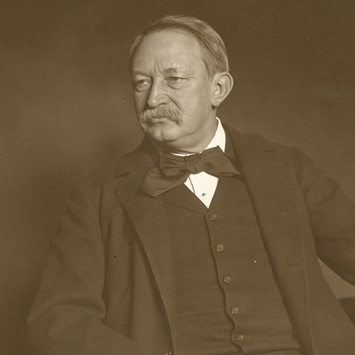Born October 11, 1835; Esens, East Friesland
Died January 4, 1905; Chicago, Illinois
Theodore Thomas showed interest in the violin at an early age and was mostly self-taught. In 1845, his family made the six-week journey to New York, where he soon became a regular member of several pit orchestras, including the Park, the Bowery, and the Niblo.
At the age of 15, Thomas was hired by Karl Eckert into New York’s Italian Opera Company as leader of the second violins; the following year, Eckert’s successor, Luigi Arditi, promoted him to the role of concertmaster. His name first appears on the New York Philharmonic Society’s roster at the beginning of its twelfth season in 1853, about a month after his 18th birthday.
In 1864, Thomas founded his eponymous traveling ensemble — the Theodore Thomas Orchestra — and he led the ensemble’s debut concert in New York’s Irving Hall. He also served as music director of the Brooklyn Philharmonic beginning in 1866 and the New York Philharmonic in 1877, serving both orchestras until the spring of 1891. Thomas founded the Cincinnati May Festival in 1873.
In 1889, Charles Norman Fay, a Chicago businessman and devoted supporter of the Theodore Thomas Orchestra, encountered Thomas in New York and inquired, “Would you come to Chicago if we gave you a permanent orchestra?” Thomas’s legendary reply was, “I would go to hell if they gave me a permanent orchestra.” In December 1890, the first meeting for incorporation of the Orchestral Association was held, and in October 1891, the first concerts of the Chicago Orchestra, led by Thomas, were given at the Auditorium Theatre.
During his tenure, Thomas and the Orchestra toured extensively, including a visit to Canada in December 1892 and the ensemble’s first trip to Carnegie Hall in March 1898. He led the Orchestra in numerous concerts as music director of the World’s Columbian Exposition in 1893, as well as in dozens of U.S. premieres of works by Bizet, Bruckner, Coleridge-Taylor, Dukas, Dvořák, Elgar, Franck, Glazunov, Grieg, Massenet, Rimsky-Korsakov, Saint-Saëns, Sibelius, Smetana, Richard Strauss and Tchaikovsky.
Thomas fully realized his dream of a permanent home for his orchestra in 1904, when Orchestra Hall, designed by Chicago architect Daniel H. Burnham, was completed. Thomas led the dedicatory concert on December 14. He had contracted influenza during rehearsals but continued to work with his customary vigor, only worsening his condition. Thomas conducted his beloved orchestra for the last time on Christmas Eve 1904, and the program included the first performances of his orchestration of the song “Träume” (Dreams) from Wagner’s Wesendonck-Lieder.


